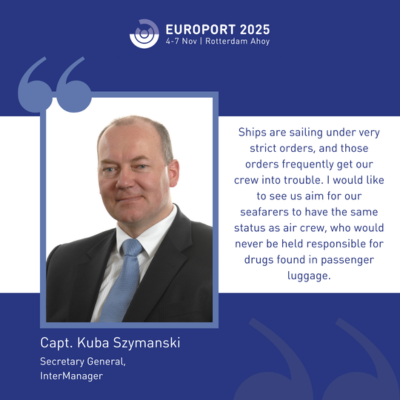Europort Industry Leaders Q&A - Capt. Kuba Szymanski

Europort 2025 will host the Career4Sea Awards, turning attention to those who have helped shape the maritime industry through leadership and dedication. Among them is Capt. Kuba Szymanski, Secretary General of InterManager, who started his maritime career as a cadet in the BP fleet and is now a leading voice for seafarers worldwide.
In this month’s Europort Industry Leader Interview, Capt. Szymanski reflects on his journey, offers advice to the next generation, and speaks candidly about the critical issues of seafarer criminalisation and blame culture still facing the industry.
What attracted you to the maritime industry and how did you get started?
Pure romance - honestly. I started sailing Opty boats (Dinghies) when I was five, then, as a rather heavy child, I moved up to bigger boats. That led me to sailing / racing yachts at sea, then tall ships which cemented a love for the sea from my teenage years.
Naturally, as it seemed I had to follow that through, in 1985 I went to Maritime University where I completed a five-year course which was actually two Masters degree courses - Navigation and Marine Biology. In 1990 I joined Dorchester Maritime Ltd of the Isle of Man as a Cadet in the BP fleet, one of its first five cadets from Poland. The rest is….history.
Over the last few years, there has been an industry wide drive focused on attracting the next generation. Is there anything else the maritime sector should be doing to attract new talent
Definitely - we need to get our house in order! Firstly, the criminalisation of seafarers has to be stopped. Our people are being detained while on duty. Ships are sailing under very strict orders, and those orders frequently get our crew into trouble. I would like to see us aim for our seafarers to have the same status as air crew, who would never be held responsible, for example, for drugs found in passenger luggage. Whereas our Captains and Chief Officers end up in jail for drugs found in cavernous holds buried within 30,000 tonnes of coal.
Another issue is the blame culture which does not allow us to learn proper lessons from maritime accidents but instead places blame on the first person found to have made a mistake, without delving deeper to find out why. If we were to tackle these two issues, we would make our lovely industry more inclusive, more caring, and even more competitive!
What is the best piece of advice you have been given over the years, and what advice would you give to someone considering a career at sea?
Make sure it is really for you. The best test would be to go sailing, and to make a trip at sea. Good maritime academies provide this as an induction, where students actually go sailing for weeks / months. This will show you whether the sea environment is actually for you. We seafarers are a very close-knit society that cares for each other. This might sound grand, but actually it’s an environment that can be overwhelming.
Also check whether you are ok to be away from your shore family and friends. Seafarers thrive in their environment, but this might be difficult for someone who has a problem with cutting their ties to shore links.
In your opinion, what is the biggest challenge for the industry at the moment when it comes to the ship management sector? How could this be overcome?
The biggest challenge is the blame culture - which creates mistrust and inhibits progress.
What is the most interesting change/trend you have seen over the last 12 months, and what impact will this have on the wider industry?
A real change is the industry waking up to its real issues. I would like to think that InterManager’s safety statistics are playing an important role in providing a good reality check.
Finally, new technology, digitalisation and AI continue to transform operations and ways of working. What benefits do such advances offer to our sector - where is caution required and how can we best prepare those serving (on land or at sea) for what’s to come?
AI’s strength depends on the collaborative data available. However, our industry is everything but 'collaborative’ on data. Shipping is sophisticated, but it is a closed environment.
Organisations responsible for collecting data hate sharing it. Therefore, even the best AI is not able to get a proper 'feel’ for our industry. That said, the world is changing and I see more collaboration taking place, particularly among InterManager members, to enable some data sharing to take place. Watch this space!



